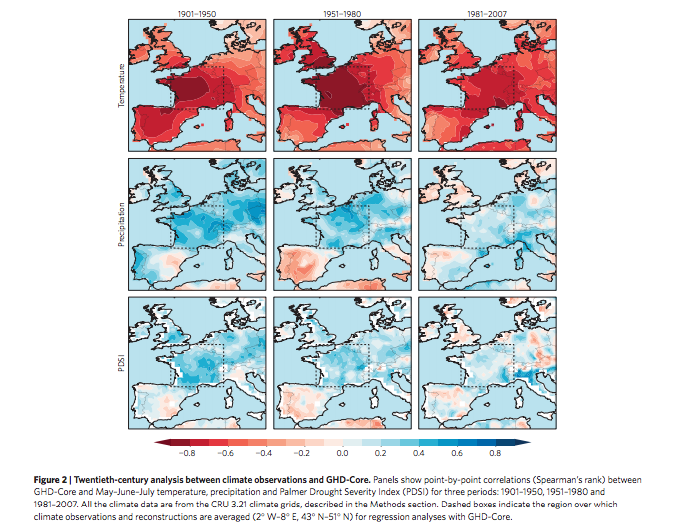The Scary Reason Your Wine Tastes Better Than Ever

By:
If the slowly sinking state of Florida hasn't put climate change on your radar, its effects may soon hit closer to home. A new study published in the journal Nature Climate Change, and reported by Columbia University's Earth Institute, looked at the impact of the warming climate on France's wine industry, and how future droughts and temperature shifts may taint what's in your glass.
Why your wine tastes better than ever.
The study focused on how climate change shaped French wine harvests specifically for several reasons.
"First, as a general rule they do not irrigate their vineyards and so it's easier to see the kind of weather and climate signal in the grapes," lead study author Benjamin Cook told ATTN:. Cook got a Ph.D. in environmental science from the University of Virginia, and currently holds a research appointment at NASA. "We also have 400 years of data, which provided a really amazing opportunity to really see how recent impacts of climate on the grapes compared to the last 400 years."
Over the last 30 years, French wine harvests have been pushed forward due to warming temperatures, the study reported. Earlier harvests tend to mean better wine, according to Cook.
"Since about 1980, the average harvest date is about ten days early compared to the average going back [to] the 1600s," Cook said. "That's a pretty significant shift, and that's driven all by recent trends toward much warmer temperatures from anthropogenic greenhouse gas emissions."
 Nature Climate Change/Benjamin Cook - nature.com
Nature Climate Change/Benjamin Cook - nature.com
What causes early harvests has also shifted significantly since the year 1980. "At any point, you get an early harvest when you have really warm temperatures," Cook said. "That still holds. Before 1980, you needed a drought to get the really warm temperatures to get a really early harvest." But today's temperatures are so high that droughts and moisture no longer play major roles.
"When you're in a drought, and you have low rainfall, low soil moisture, there's very little evaporation, and it boosts the heat at the surface," Cook explained. "But after 1980, it's warm every year thanks to climate change, so you no longer need a drought to get those really early harvests."
The spike in wine quality may not last.
While typically, earlier harvests lead to tastier wine, this isn't always the case, and Cook believes that temperatures will soon rise to a point where wine quality will level off and even decrease.
"So we have seen with these earlier harvest dates so far, an overall trend towards higher quality wines in this region," Cook explained. "But there's some evidence in the data that there might be kind of an upper limit to this, beyond which an early harvest will either not help or may even be detrimental."
In 2003, when there was a record breaking heat wave, French wine quality wasn't particularly high.
"The harvest was about a month early, the earliest harvest in the entire record. And you know, because of the relationship between harvest date and quality you might expect that this year would have generated really, really good wines, but if you actually look at the wine quality, the ratings, they were about middling," Cook said.
"2003 is the type of event and the type of year that we expect to happen more frequently with climate change in the coming decades," Cook explained. "So that's why we think there may be this upper limit beyond which for whatever reason the early harvests are not going to help you anymore."
How wine will change.
ATTN: also spoke to Laura Cypress, an Assistant Winemaker at City Winery Nashville, over email about how climate change has impacted the industry and her own experience. Cypress has also worked at wineries in Australia, France, California, and New York's Hudson Valley.
"The glory of winemaking is all about vintage variation, and capturing an entire year's climate and viticultural challenges in a bottle," Cypress told ATTN: over email. "There will always be challenges to overcome, good years, and bad years, based on the climate."
While she recognized that climate change has impacted winemaking practices, other factors and natural disasters also contributed to shifts in quality and irrigation practices. Cypress explained:
"On a short-term basis, we can definitely see changes in our viticultural practices and its result on the wines, but each year is naturally different in the vineyard. It's difficult to tell with certainty the difference between natural vintage variation, and influence of climate change. Anecdotally, we are seeing more and more cool-climate regions growing cultivars that were typically only grown in warmer climates. Drip irrigation being installed in regions that typically would dry-farm. Natural disasters, hail storms, earthquakes affecting vineyard yields."
It is her personal belief that climate change wouldn't hugely shatter the industry, and she hopes that people's tastes will change along with changes in the wine itself.
"By the mid-century, people's palates would likely adapt to the wines made from grapes grown in these ever-changing climates. The ever-changing definition of 'quality' will continue to evolve," she told ATTN: over email. "But what even is quality, anyways, but a fluid concept, changing based on time and culture."
Answering Cypress's concerns, Cook explained that while he didn't believe his research signaled doom for winemakers, he hoped it would enrich the conversation. "The fact is, the wine industry has been aware of the importance of climate and climate change for a long time," he told ATTN: over email. "Our study simply adds another piece to the puzzle."
